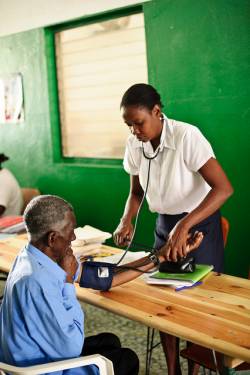 The First World Congress on Healthy Ageing took place this month in Malaysia, with over 1,500 delegates attending from nearly 40 countries. The main theme of the congress was holistic and active ageing.
The First World Congress on Healthy Ageing took place this month in Malaysia, with over 1,500 delegates attending from nearly 40 countries. The main theme of the congress was holistic and active ageing.
It was heartening to see the holistic focus of the conference, as well as the effort to bridge gaps between medical care and other important aspects of ageing.
A lot of the discussion centred around making active and healthy ageing a priority in the coming years. Often ageing is associated with disability and dependence, but this should be changed to an association with health, productivity and independence.
Sharing experience of healthcare work
For this to happen, comprehensive programmes focusing on health, livelihoods and social protection are needed. The HelpAge network shared their experiences of these programmes throughout the event.
Geographical distribution of older populations is of great significance and will have important implications in the future. Currently, about 55% of people above the age of 60 live in the Asia-Pacific region. This is likely to increase to a staggering 63% in the not too distant future.
By 2050, 33 countries will have at least 10 million older people respectively. And China, India and the US, three of the largest countries in the world, will have a combined older population of about 768 million.
Immunisation often forgotten
An important aspect of preventing diseases in older age is immunisation, something which is often forgotten in healthcare programmes. Respiratory tract infections remain the leading cause of death in older age. Pneumonia and influenza are also serious health challenges.
Figures suggest that one third of all influenza deaths worldwide are older people. Worse still, some 90% of all pneumonia deaths are in people over 65. Overall, pneumonia in older people has a 30 to 50% death rate, which is severely high.
These infections are preventable through vaccines that are widely available. While these vaccines can be expensive, they certainly save a great deal of money spent on treatment of respiratory infections.
Importance of active ageing recognised
A number of initiatives have started to emphasise the importance of active ageing. 2012 is the EU year of active ageing. Asia Pacific Economic Cooperation (APEC) has also put greater focus on active ageing in its recent meeting. According to John Beard, the Director of Ageing at the World Health Organization (WHO), active ageing is now one of their top five priorities.
The WHO initiative of age-friendly cities is also growing further with Kolkata joining the list as the first age-friendly city in India. Additionally, 7 April is World Health Day, which also focuses on health and active ageing.
The Organisation for Economic Co-operation and Development (OECD) in its 50th anniversary recently recognised ageing as a key challenge.
A life cycle approach to ageing was also given a lot of emphasis. The need for early interventions in life to ensure active and healthy life later was recognised too. Good thoughts towards an age-friendly world.
Find out more about HelpAge’s work to promote active and healthy ageing.
